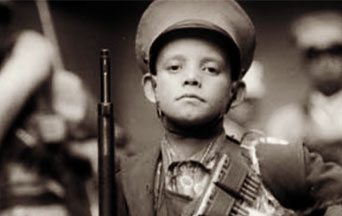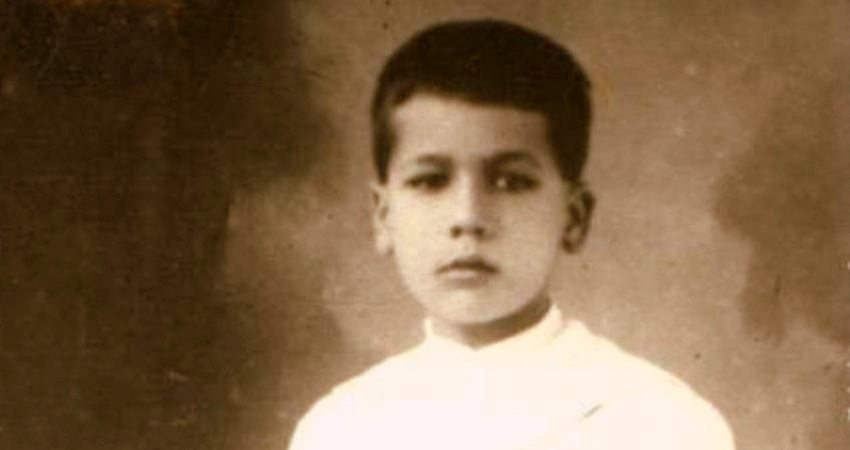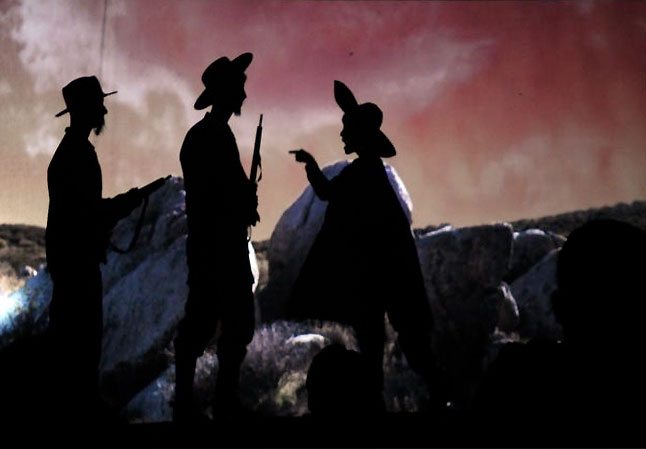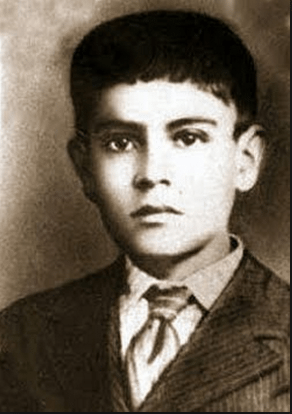
Our young saint lived in tumultuous times. The socialist government of Mexico was waging a bloody war against the Catholic Church, and fervent Catholics known as the Cristeros rose up to defend Christ the King. Their heroic resistance, La Cristiada, began in 1926.
Background
The Mexican constitution of 1917—socialist at its core—sparked this terrible conflict. It put the Church under the strict control of the State: it regulated Catholic preaching, allotted a fixed number of priests per state, dictated Mass attendance, baptisms, weddings, the Sacraments, and tithing. Even the ringing of Church bells was hampered, and prelates caught disobeying these unjust laws were exiled or killed.
The president at the time, Venustiano Carranza, did not immediately enforce the anti-Catholic laws, but showed temporary tolerance. When Plutarco Elías Calles took power in 1920, however, the new constitution was brutally enforced. Calles sent more than two hundred priests into exile, along with a number of archbishops and bishops.
The worst persecution was unleashed by the iniquitous Ley Calles (Calles Law) of July 31, 1926. It prohibited the practice of the Catholic religion in public. All education was removed from the care of the Church and put under direct State control. Religious vows were illegal. Monasteries and convents were dissolved, and religious could no longer use habits. Church property was confiscated.
Moreover, it was illegal for anyone, especially priests, to speak out against the government or the constitution. Priests wishing to exercise their ministry had to ask the State for permission. Frequently, this “permission” was not granted. Finally, those who did not obey these immoral laws were fined or imprisoned. A “serious” or repeated offense often meant execution.
Cristero Uprising
In this turmoil, God rose up a strong reaction: the Cristeros. Among these Catholics we find the heroic figure of José Sánchez del Río. The young saint was born on March 28, 1913 in Sahuayo, Michoacan. His parents, Macario Sanchez Sanchez and Maria del Río Arteaga, had three older sons, two of whom joined the Cristeros.

José witnessed the horrible persecution of the Church and, following his brothers, decided to join the Cristiada movement. He was so young, however, that his parents were reluctant. After much pleading and a visit to a Cristero officer, don Macario and doña Maria gave José their parental blessing. José was overjoyed, but also aware of the suffering he would endure. Before departing, he declared: “For Jesus Christ, I will do everything.”
José and a friend, Trinidad Flores, set off to a Cristero camp. After a long journey they presented themselves to the officer in charge and were given tasks: carry water, prepare the fire, serve food and coffee, wash dishes, feed the horses, and clean rifles.
José enthusiastically went about the chores, and the soldiers quickly became fond of him. He fervently attended daily Mass and prayed the Rosary with the soldiers every evening. José learned how to play the bugle for battle, and was put under the care of General Luis Guizar Morfin who, with the intention of protecting the lad, gave him the duty of standard bearer.
How He Saves the General
Outnumbered and outgunned, the Cristeros used guerrilla tactics over pitched battles. On February 6, 1928, the Cristeros ambushed the enemy, between Cotija and Jiquilpan. When the order was given to retreat, Federal machine gun fire opened up on their position, ripping through the rocks that gave the Cristeros cover. José saw the General’s horse drop dead beneath him. Although the General himself was not seriously injured, José rushed over, jumped off his own horse and urged him to take it:
“General, here’s my horse!”
The general replied: “Run boy, run! Go!”
But José insisted: “I am young; you are more important than me! Viva Cristo Rey!”
Overtaken by the boy’s sacrifice, the general accepted the horse and fled. José, refusing to run, stayed behind to provide covering fire for his fellow Cristeros, but he soon ran out of ammunition and was captured by the Federals. They pushed, hit, kicked and insulted him while uttering foul blasphemies. Another young boy, Lorenzo “El Escurridizo,” was captured as well. Their execution was interrupted by a federal general who asked the two boys to join the anti-Catholic side. José answered without hesitation:
“You have captured me because I ran out of ammo, but I have not given up!” Surprised by the answer, the general threw José and Lorenzo into prison at Cotija.
Behind Bars Yet Always Faithful

In his prison cell, José remembered the advice of his dear mother: have complete confidence in the Mother of God, Our Lady of Guadalupe.
As the early morning sun shone through the tiny window in José’s cell, he wrote a letter to his mother dated February 6, 1928.
My dear mother:
I was made a prisoner in battle today. I think I will die soon, but I do not care, mother. Resign yourself to the will of God. I will die happy because I die on the side of our God. Do not worry about my death, which would mortify me. Tell my brothers to follow the example that their youngest brother leaves them, and do the will of God. Have courage and send me your blessing along with my father’s.
Send my regards to everyone one last time and finally receive the heart of your son who loves you so much and who wanted to see you before dying.
— José Sánchez del Río
On February 7, José and Lorenzo were transferred from the prison in Cotija to the Catholic church in Sahuayo—where José was baptized—which had been turned into a stable for animals by the impious federals. Horse manure, military supplies, empty beer bottles, and food scraps covered the floor. Soldiers vandalized the altar, using its wood to start a fire. The church, once beautiful, was now disfigured beyond recognition.
News of José’s imprisonment spread rapidly. Attempts were made to obtain his release, but the soldiers refused to let him go. José’s godfather, Rafael Picazo, a local political boss in Sahuayo, visited him. This man, however, was a federal sympathizer and he slyly attempted to convince José to attend military school and become an officer in the Federal Army. José was shocked by the proposal and replied:
“I’d rather die first! I will not go with those monkeys! Never with those persecutors of the Church! If you let me go, tomorrow I will return to the Cristeros! Viva Cristo Rey! Viva La Virgen de Guadalupe!”
Zeal for the House of God
José was outraged by the sacrilegious behavior of his captors who released fighting cocks inside the church, and had them fight in the sacred sanctuary. The colorful fighting birds roamed freely, perching on sacred objects, including the tabernacle. But as soon as José saw them, he decided to stop the profanation of the altar. Disregarding certain reprisal from the guards, he grabbed the roosters and cracked their necks one by one.
After he finished them off, José washed his hands with a rag, knelt down and prayed devoutly with a strong and loud voice. He then went calmly to bed. Of this episode, author Luis Laurean Cervantes remarks, “As Christ had cleaned the vendors out of the Temple, he [José] had cleaned it of fighting cocks.”
The next morning, when Picazo saw what José had done, he was enraged. Picazo wrenched José up by the arm and screamed:
“Don’t you realize what you did? Don’t you know the cost of a rooster?!”
José replied: “The only thing I know is that the house of God is not a corral nor a barnyard! I am willing to endure everything. Shoot me now so that I can go before Our Lord!”
Lorenzo, who was also in the church-prison, grew scared, but José counseled him to remain strong, and spoke about Christ, the Virgin of Guadalupe, and the stories of Anacleto González Flores and Father Miguel Pro—both martyrs.
“Viva Cristo Rey!”
On February 10, Picazo made up his mind to execute his godson. The order to kill José Sánchez del Río was issued at six o’clock and the execution itself was scheduled for eight-thirty.
José was allowed to write a final letter to his family, which he did. Thirty minutes before the execution, José’s aunt Magdalena brought him dinner. At her request, a priest hid the Blessed Sacrament in the food package and José secretly received Holy Communion for the last time.
Then José bid his aunt farewell: “We will see each other in Heaven soon.” José was about to cry, but he chocked back his tears because he didn’t want to weep in front of a woman. “…take care of my mother. Tell her not to rush [to see me] as I will have already won Heaven.”
Finally, the time for the execution arrived. Picazo wanted the execution to be done “quietly” without a formal firing squad. Instead, the federals cut the soles of José’s feet with a knife. They brutally beat him over and over, but with each cut and each savage blow, he shouted: “Viva Cristo Rey!”
Learn All About the Prophecies of Our Lady of Good Success About Our Times
His Way of the Cross
The guards made José walk ten blocks, barefoot and bleeding, along a rocky path to the cemetery were he would be buried. Along the way, the soldiers screamed blasphemies with satanic hatred, praising the godless government, trying to pressure the boy to deny his faith: “You better learn your lesson!” “We will kill you!” “What a proud and arrogant boy!” they said.
José’s only response was: “Viva Cristo Rey!” and “Viva La Virgen de Guadalupe!”
Already at the cemetery, José asked: “Where is my plot?” as he did not want any of the troops to touch him. One of the soldiers suddenly swung his rifle around, breaking José’s jaw with the butt. Without hesitation, the soldiers furiously stabbed him in the neck, chest and the back with knives. At every stab, José proclaimed the name of Christ the King at the top of his lungs, “Viva Cristo Rey!”
José was dying slowly. But he still mustered enough energy to defy the soldiers, saying: “You have done a lot to me, but God still allows me [to continue]! But when I can no longer speak, if I wiggle my feet, that means, ‘Viva Cristo Rey and the Virgin of Guadalupe!’”
A federal officer approached the dying and bleeding boy on the ground and asked in a sarcastic tone: “What should we tell your father?” José answered: “That we will see each other in Heaven! Viva Cristo Rey! and the Virgin of Guadalupe.”

The Crown of Martyrdom
Overtaken by anger, the officer grabbed his gun and shot José behind the ear. José Sánchez del Río won the crown of martyrdom.
The federals tossed the boy’s body into the grave, shoveled some dirt over it and left. Luis Gomez, the undertaker, waited for the federals to leave and immediately closed the gates of the cemetery. He ran to the house of Father Ignacio Sanchez, José’s uncle, and asked the priest to give the martyr a Christian burial. Luis and the priest hurried back to the cemetery. They took José’s mangled body out of the grave and wrapped it in a blanket while the priest prayed the prayers for the dead.
Soon, everyone knew about the boy-martyr. People started to pray to him. His heroic life quickly became a model across Mexico.
The body of the martyr was buried in that same cemetery until 1945. After Fr. Miguel Serrato repaired the local church of the Sacred Heart, blessed José’s remains were transferred to its shrine where other Cristero martyrs are interred. Finally, in 1996 his remains were moved to the parish church where he was held captive. His relics are kept in a wooden coffin in the baptistery, the same place where he was held captive. He was beatified on June 22, 2004, and on October 16, 2016 was canonized a saint.
Let us imitate the virtues of this young saint: fortitude, valor, faith, holy audacity, hope and charity. Let us pray for the grace to have the same enthusiasm to defend the law and the rights of God that are under attack today, and to endure all hardships for the greater glory of God and Holy Mother Church.
Saint José Sánchez del Río, pray for us.
Viva Cristo Rey!
Juan Gutiérrez, a surviving Cristero, penned the Cristeros hymn, “Battle Hymn of the Cristeros”, which is based on the music of the Spanish-language song, “Marcha Real”
Spanish
La Virgen María es nuestra protectora y nuestra defensora cuando hay que temer
Vencerá a todo el demonio gritando “¡Viva Cristo Rey!” (x2)
Soldados de Cristo: ¡Sigamos la bandera, que la cruz enseña el ejército de Dios!
Sigamos la bandera gritando, “¡Viva Cristo Rey!”
English translation
The Virgin Mary is our protector and defender when there is to fear
She will vanquish all demons at the cry of “Long live Christ the King!” (x2)
Soldiers of Christ: Let’s follow the flag, for the cross points to the army of God!
Let’s follow the flag at the cry of “Long live Christ the King!”

